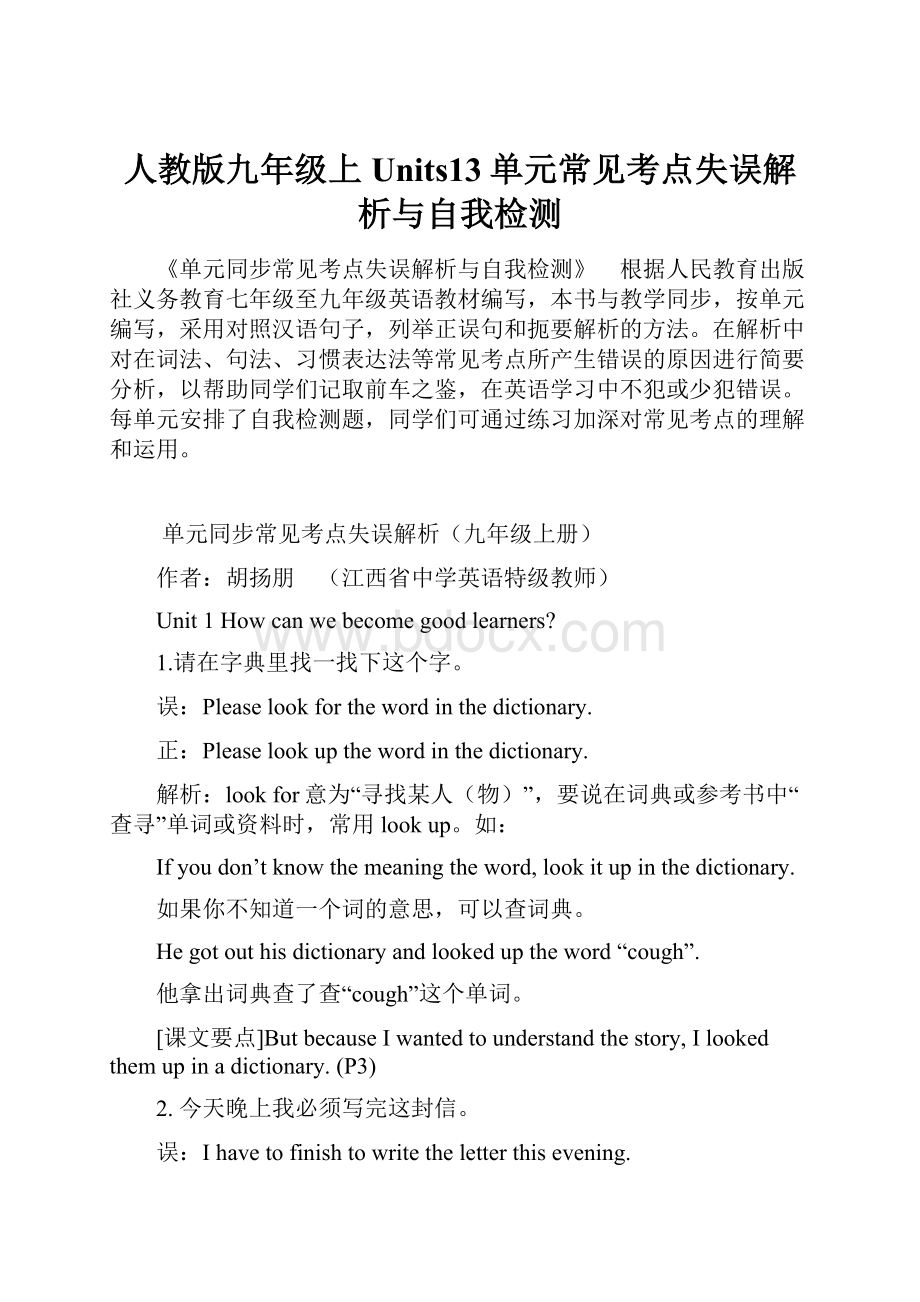人教版九年级上Units13单元常见考点失误解析与自我检测.docx
《人教版九年级上Units13单元常见考点失误解析与自我检测.docx》由会员分享,可在线阅读,更多相关《人教版九年级上Units13单元常见考点失误解析与自我检测.docx(23页珍藏版)》请在冰豆网上搜索。

人教版九年级上Units13单元常见考点失误解析与自我检测
《单元同步常见考点失误解析与自我检测》 根据人民教育出版社义务教育七年级至九年级英语教材编写,本书与教学同步,按单元编写,采用对照汉语句子,列举正误句和扼要解析的方法。
在解析中对在词法、句法、习惯表达法等常见考点所产生错误的原因进行简要分析,以帮助同学们记取前车之鉴,在英语学习中不犯或少犯错误。
每单元安排了自我检测题,同学们可通过练习加深对常见考点的理解和运用。
单元同步常见考点失误解析(九年级上册)
作者:
胡扬朋 (江西省中学英语特级教师)
Unit1Howcanwebecomegoodlearners?
1.请在字典里找一找下这个字。
误:
Pleaselookforthewordinthedictionary.
正:
Pleaselookupthewordinthedictionary.
解析:
lookfor意为“寻找某人(物)”,要说在词典或参考书中“查寻”单词或资料时,常用lookup。
如:
Ifyoudon’tknowthemeaningtheword,lookitupinthedictionary.
如果你不知道一个词的意思,可以查词典。
Hegotouthisdictionaryandlookeduptheword“cough”.
他拿出词典查了查“cough”这个单词。
[课文要点]ButbecauseIwantedtounderstandthestory,Ilookedthemupinadictionary.(P3)
2.今天晚上我必须写完这封信。
误:
Ihavetofinishtowritetheletterthisevening.
正:
Ihavetofinishwritingtheletterthisevening.
解析:
finish意为“完成”,用作及物动词,后跟名词,代词或动词-ing形式,不可以跟动词不定式。
如:
Wefinisheddoingourhomework.
我们已经做完了家庭作业。
[课文要点]IhavetofinishreadingabookandgiveareportnextMonday.(P2)
3.他不愿依赖他的父母供给衣食。
误:
Hedidn’twanttodependhisparentsforfoodandclothing.
正:
Hedidn’twanttodependonhisparentsforfoodandclothing.
解析:
depend意为“依靠”;“信赖”,用作不及物动词。
如:
Iwanttoleaveearlybutitdepends.我想早点离开,但那要看情况才能定。
depend一般要与on/upon连用,后跟宾语。
如:
Whetherwe’llstartornottomorrowdependsupontheweather.
我们明天出不出发,要看天气而定。
Hedidn’twanttodependonhisparentsforfoodandclothing.
他不愿依赖他的父母供给衣食。
[课文要点]Butwhetherornotyoucandothiswelldependsonyourlearninghabits.(P6)
4.天气如此之好,我想去海滩。
误:
ItissoniceweatherthatIwouldliketogotothebeach.
正:
ItissuchniceweatherthatIwouldliketogotothebeach.
解析:
“so…that…”句型意为“如此(这么)……以至于……”,常引导结果状语从句。
该句型中的so是副词,常用来修饰形容词或副词。
如:
Theclassroomissonoisythatwecan’theartheteacherclearly.
教室太吵以至于我们听不清楚老师的话。
“such…that…”结构也可以表示“如此(这么)……以至于……”,加such用于修饰名词,注意名词前常常可以有形容词修饰。
如果是单数可数名词,则such后要不定冠词;如果是不可数名词或名词复数形式,则不加冠词。
如:
Heissuchagoodboythateverybodylikeshim.
他是那样的好孩子,以至于大家都喜欢他。
Therearesuchalotofpeoplethatwecouldhardlymoveon.
我很多,我们简直没法往前走。
[课文要点]TheteacherspokesoquicklythatIdidnotunderstandhermostofthetime.(P3)
5.尽管天快黑了,但是我还是要马上走。
误:
Althoughitisgettingdark,butIhavetoleaverightnow.
正:
Althoughitisgettingdark,Ihavetoleaverightnow.
正:
Itisgettingdark,butIhavetoleaverightnow.
解析:
although意为“尽管……但是……”;“虽然……但是……”,表示“让步关系”,引导让步状语从句,如果置于主句前常用逗号与主句隔开。
注意:
although不可以与but连用,二者只能先其一。
如:
Althoughheisyoung,heisclever.
他年纪虽然轻,但是很聪明。
Althoughitwasraininghard,theywentonworkinginthefield.
虽然在下大雨,但他们还 继续在地里劳动。
Although引导的从句也不能与however连用,但可以与yet,still连用。
如:
Althoughhewasold,yetheworkedhard.
他虽然年老了,但工作仍然很努力。
[课文要点]AlthoughIcouldnotunderstandeverythingthecharacterssaid,theirbodylanguageandtheexpressionsontheirfaceshelpedmetogetthemeaning.(P3)
6.我们班所有的人都到了。
误:
Everyoneinourclassarehere.
正:
Everyoneinourclassishere.
解析:
everyone意为“每人;人人”,等于everybody。
用作主语时,谓语动词用单数形式。
如:
EveryoneinChinalikesMid-AutumnDay.
每一个中国人都喜欢中秋节。
Everyonehasachancetodooralpractice.
人人都有做口语练习的机会。
[课文要点]Everyoneisbornwiththeabilitytolearn.(P6)
7.我一直想知道她在干什么。
误:
Ikepttowonderwhatshewasdoing.
正:
Ikeptwonderingwhatshewasdoing.
解析:
keep意为“一直”;“继续”,后跟动词-ing形式表示“一直(反复)做某事”,不可以说keeptodosomething。
如:
Ikeptworkingafterdark.
天黑后他们继续工作。
Youshouldn’tkeepthinkingaboutit.
你不要总想着它。
[课文要点]Goodlearnerswillkeeppracticingwhattheyhavelearned,andtheyarenotafraidofmakingmistakes.(P6)
8.这是我们可以解决这个问题的最好方法。
误:
Thisisthebestwaywhichwecansolvethisproblem.
正:
Thisisthebestway(that)wecansolvethisproblem.
解析:
当先行词被形容词最高级修饰时,其后的定语从句只能用关系代词that引导,不能用which引导。
如果that在该定语从句中作宾语,则可以省略;做主语则不能省略。
如:
Englishisthemostdifficultsubject(that)youwilllearnduringtheseyears.
英语是这几年当中你所学科目最难的一科。
[课文要点]Goodlearnersknowthebestwaytheycanstudy.(P6)
9.政府尽力帮助贫困儿童就学。
误:
Thegovernmenttrieshelpingthepoorchildrengotoschool.
正:
Thegovernmenttriestohelpthepoorchildrengotoschool.
解析:
trydoingsomething与trytodosomething两者意思不同。
trydoingsomething“(用某种方法)尝试做某事”,表示想知道结果而尝试着做,否定形式为trynotdoingsomething。
如:
Wetriedgivinghermilktodrink,butshedidn’tgetbetter.
我们试着给他喝牛奶,但她还是没有好转。
trytodosomething意为“努力(设法)去做某事”,强调付出努力,否定形式为trynottodosomething。
如:
Itriedtogethereearlybutcouldn’t.
我尽力想早点到这儿来,可是来不了。
[课文要点]Trytoguessaword’smeaningbyreadingthesentencesbeforeandafterit.(P3)
10.你微笑的越多,就感觉越快乐。
误:
Yousmilemore,youwillfeelmorehappily.
正:
Themoreyousmile,thehappieryouwillfeel.
解析:
“themore比较级+themore比较级”,意为“越……,越……”在这种结构中,第一个the+比较级为状语从句,第二个the+比较级为主句,两个“the”的后面都必须跟形容词或副词的比较级形式。
如:
The more you learn,the moreeasilyyou can get a job.
你学到的东西越多,你就越容易找到工作。
Themoreexcitingitis,thehappiertheyare.
越是有趣,他们就越是高兴。
注意:
这种结构中的谓语动词一般情况下:
主句用将来时态,从句用一般现在时态(代替将来时态)。
如:
Thesooneryoustart, thesooneryouwillfinish.
你开始的越早,你就完成得越快。
[课文要点]Themoreyouread,thefasteryou’llbe.(P2)
11.你应该注意拼读这个单词。
误:
Youshouldpayattentiontospelltheword.
正:
Youshouldpayattentiontospellingtheword.
解析:
payattentionto意为“注意”;“对……留心”,是一个固定搭配的词组,to是介词,其后跟名词、代词或动词-ing形式,不可以后跟词原形。
attention前面不能加物主代词或冠词,但可以用much,alotof,more,little,no等修饰。
如:
Youmustpayattentiontoyourhealth.你必须注意你的身体。
Shetoldustopaymoreattentiontoourpronunciation.她告诉我们多注意语音。
Pleasepayattentiontospellingtheword.请注意拼读这个单词。
[课文要点]Studiesshowthatifyouareinterestedinsomething,yourbrainismoreactiveanditisalsoeasierforyoutopayattentiontoitforalongtime.(P6)
12.他有说英语的能力。
误:
HehastheabilityofspeakingEnglish.
正:
HehastheabilitytospeakEnglish.
解析:
ability意为“能力”;“本领”,多用作不可数名词。
表示“有能力做某事”可以说havetheabilitytodosomething,但不可以接of加动词-ing形式。
如:
Brucehastheabilitytoscoreagoal,butwillhedoit?
布鲁斯有进球的能力,但他会不会去做呢?
ability还可解作“才能”;“才干”;“技能”,特别指智力方面的能力,有复数形式。
如:
Heisamanofmanyabilities.他是一个有多方面才能的人。
[课文要点]Everyoneisbornwiththeabilitytolearn.(P6)
[自我检测]
单项填空:
1.—Doyouknowhowtopronouncethisword?
—Yes.I_____inthedictionaryyesterday.
A.lookeditupB.workeditoutC.gaveitawayD.pickeditup
2.—Camyoufinish________thesebooksbefore10o’clock?
—Yes,Ican.
A.toreadB.readC.readsDreading
3.—AreyougoingtoBraziltowatch2014FIFAWorldCup(2014年世界杯足球赛)thissummer?
—I’mnotsure.It________time.
A.dependsonB.caresaboutC.agreestoD.findsout
4.Lilywas_______hungry_______sheatethreehamburgersinonego.
A.too;toB.so;thatC.enough;thatD.such;that
5.—Look!
Somepeoplearerunningtheredlights.
—Weshouldwaitothersarebreakingtherule.
A.althoughB.ifC.unlessD.because.
6.EveryoneexceptTomandJohn________seenthefilm.
A.isB.hasC.areD.have
7.Formanyyearshehaskept________tous
A.keepsB.tokeepC.keepingD.kept
8.Oneofthemostdeliciousdrinks________Ilikeisorangejuice.
A.whichB.thatC.thoseD.whom
9.—Ididn’thearyoucomeinjustnow.
—That’sgood.Wetried_______anynoise,foryouweresleeping.
A.notmakeB.nottomakeC.tomakeD.making
10.—Youshouldn’teattoomuchjunkfood.It’sbadforyourhealth.
—You’reright.junkfoodIeat,Iwillbe.
A.Theless;thehealthierB.Theless;thehealthy
C.Themore;thehealthierD.Themore;thehealthy
Unit2Ithinkthatmooncakesaredelicious!
1.母亲答应生日时给我买件礼物。
误:
Mymotherpromisedbuyingmeagiftonmybirthday.
正:
Mymotherpromisedtobuymeagiftonmybirthday.
解析:
promise意为“许诺”;“答应”,是及物动词,后跟动词不定式作宾语,意为“答应做某事”,其后不可以跟动词-ing形式。
如:
Hepromisedtohelpus.
他答应要帮助我们。
注意:
promisesomebodytodosomething意为“答应某,(自己)做某事”。
如:
He promised me to finish the job today.
他答应我说今天(他)要把这项工作做完。
[课文要点]Hedecidedtochangehislifeandpromisestobeabetterperson.(P14)
2.我打算三周后去上海。
误:
IamgoingtoShanghaiafterthreeweeks.
正:
IamgoingtoShanghaiinthreeweeks.
解析:
“in+段时间”常用于含将来概念的句子中,意思是“在多长时间以后”或“在多长时间以内”;而“after+段时间”常用于过去时的句子中,表示“在多长时间以后”。
比较:
He will come back in ten days.
他将在十天后回来.
He said he would come back in ten days.
他说他将在10天后回来.
He came back after ten days.
他10天后回来了.
The old man left home in 1924 and came home after thirty years.那老人1924年离开家.30年后才回来.
“in+段时间”也可用于过去时,意思是“在......内”。
如:
He wrote the book in two and a half years.
他是在两年半的时间里写完这本书。
He finished drawing a beautiful horse in five minutes.
他五分钟内就画好了一匹漂亮的马.
注意:
如果after后接的不是段时间,而是点时——则可用于将来时。
如:
My brother will go there after four o'clock.
我兄弟四点钟后去那儿.
He will leave after New Year's Day.
过了元旦他就要走.
[课文要点]IamgoingtoChiangMaiintwoweeks.(P10)
3.狗在很多方面和狼相似。
误:
Adogissimilarwithawolfinmanyways.
正:
Adogissimilartoawolfinmanyways.
解析:
besimilarto是固定短语,意为“与……相似的;类似的”,不可以说besimilarwith。
如:
Hisproblemsaresimilartomine.
他的问题和我的差不多。
[课文要点]Iwonderifit’ssimilartotheWaterFestivaloftheDaipeopleinYunanProvince.(P10)
4.无论谁来赴晚宴对我来说都无所谓。
误:
Whoevercomestodinnerisallthesametome.
正:
Whoevercomestodinnerisallthesametome.
解析:
ever用在各种疑问句后,加强该疑问句的意气,译为“到底”;“究竞”。
如:
Whoever toldyoutoaskmetolendyouthemoney?
究竟是谁叫你求我借给你钱?
Whereeverdidhegoyesterday?
他昨天到底去了哪里?
whoever意为“无论谁”,引导主语从句。
意义相当于anyonewho,即表示“任何人……都”“谁……谁就(都)”“不管是谁……那都”。
如:
Whoevercomeswillbewelcome.
谁来都欢迎。
Whoeverwantsthebookmayhaveit.
任何人想要这书都可以拿去。
注意:
whoever也可以引导让步状语从句(=nomatterwho)。
如:
Whoevercomes,tellthemtogoaway.
不管谁来,都叫他走。
I’mnotopeningthedoor,whoeveryouare.
不管你是谁,我不会开门的。
[课文要点]Whoeverdrankthiscouldliveforever,andHouYiplannedtodrinkitwithChang’e.(P11)
5.他拒绝让我走。
误:
Herefusedlettingmego.
正:
Herefusedtoletmego.
解析:
refuse意为“拒绝”,可用作及物或不及物动词,作及物动词时后跟名词、代词或带to动词不定式作宾语,不可以跟动词-ing形式。
如:
Iaskedhim